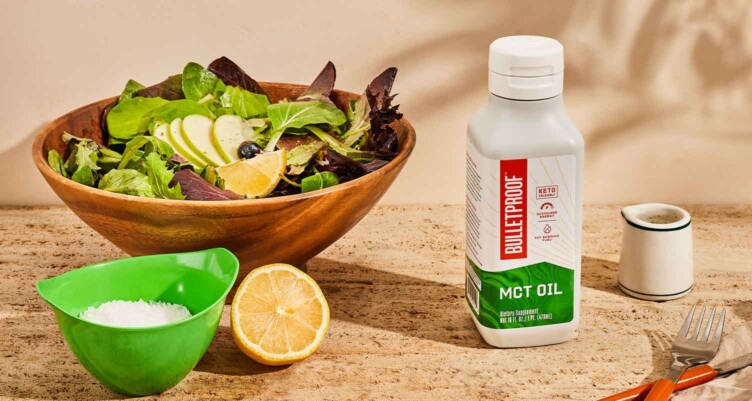MCT Oil and Keto: How to Boost Ketones with Quality Fat

- MCT oil is an essential keto supplement for people who want to reap the benefits of burning fat for fuel—aka ketosis.
- When your body is in ketosis, you produce ketones. Ketones help curb food cravings, increase your energy levels and increase your metabolic rate.
- Certain types of MCT oil are more effectively broken down into ketones. C8 (caprylic acid) is the gold standard because it most effectively provides ketone energy for your body. You can get pure C8 in Bulletproof Brain Octane C8 MCT oil.
If you follow a keto diet, you’ve likely heard that MCT oil and keto are a perfect match. But what is MCT oil, and how does it help someone stay in ketosis? Don’t worry—we have you covered in this guide to MCT oil and the ketogenic diet.
The ketogenic diet is a powerful low-carb diet known to help burn body fat and kick sugar cravings to the curb. Supplementing your keto diet with MCT oil makes ketosis easier and more effective.
You reap all the benefits of keto when you’re in ketosis, a state in which your body burns fat instead of carbs for fuel. However, getting into ketosis (and staying here) can be tough in a world filled with refined sugars and carbohydrates.
Keep reading to find out why MCT oil and keto work so well together—and how you can use it to take your fat-burning benefits to the next level.
How MCT oil benefits ketosis

Fatty acids make up the building blocks of fat, both in your body and in your food. Fatty acid molecules have chains of carbon atoms. The length of the chain determines how they work in your body.
“MCT” stands for “medium chain triglycerides,” a type of medium chain fatty acid. MCTs are naturally found in coconut oil, and they have a few unique properties that make them an essential part of your keto body fat-burning toolkit.
Unlike short-chain and long-chain fatty acids, certain types of MCTs aren’t digested by your stomach. These types—called caproic acid (C6, or six carbon chains), caprylic acid (C8) and capric acid (C10)—actually skip your gut altogether. They go straight to your liver, where they’re broken down into ketones and distributed in your bloodstream.
Your body produces ketones when it’s burning fat for fuel, aka ketosis. When you supplement your diet with MCTs, your body ups ketone production. That means more fuel is available for your cells.
Ketones have also been shown to help curb food cravings, increase your energy levels and increase your metabolism—health benefits we can all get behind. [1][2][3]
Those benefits are a big deal for people who want to get more ketones in their system and stay in ketosis. However, this doesn’t mean that you can chase your bagel with a shot of MCT oil and call yourself keto. It’s a dietary supplement, not a magic bullet.
You still have to stick to a low-carb, high-fat diet to help your body burn fat for fuel and get the most out of being in ketosis. These benefits can range from maintaining a healthy body weight to a sense of greater cognitive function. Read more about other benefits of MCT oil.
How to use MCT oil on keto

Pure MCT oil is flavorless and odorless, so it’s easy to add to your diet. Blend it into Bulletproof Coffee, use it to make tasty salad dressings or add it to smoothies as a source of energy from quality fats. If you’ve never used MCT oil before, start with just 1 teaspoon and slowly increase the amount as your body adjusts.
You can even use MCT oil to experiment with your carb intake without wrecking the benefits of ketosis. On the standard ketogenic diet, you consume less than 50 grams of net carbs per day. Some people thrive within that range, while others experience sleep problems, thyroid issues and fatigue when they restrict their carbs for extended periods. [4][5]
If you experience any of these symptoms, also known as the “keto flu”, you might need to adjust your carb intake or try carb cycling. To learn more about how to combat keto side effects, take a look at our guide on keto flu.
When you eat a lot of carbohydrates, your blood sugar spikes because your body converts those carbohydrates into glucose. However, C8 MCT oil increases your ketone levels so effectively that your brain will consume the ketones it prefers instead of glucose. That means you can eat slightly more carbs than normal without spiking your blood sugar levels and igniting food cravings. As an example, check out this research on combining fat from coconut oil and white rice so it doesn’t cause your blood sugar levels to go haywire.
In short, MCT oil is a powerful supplement when you’re following a low-carb, high-fat diet. Burn fat, increase your focus and stay in ketosis by using high-quality MCTs like Brain Octane C8 MCT oil, and don’t be afraid to experiment with your carbohydrate levels. To learn more about MCT oil uses beyond the keto diet, check out our ultimate guide to MCT oil.
Related: The Ultimate Intermittent Fasting Guide for Beginners
Where some MCT oils come up short

Remember those different types of MCT oil—C6, C8 and C10? You have to read your labels to determine what specific type of MCTs the manufacturer is using in their products.
Some MCT oil products on store shelves are a classic case of “buyer beware.” You’ll find formulas that are diluted with lauric acid (C12), which is cheaper than other MCTs—but not as effective at quickly producing ketones. C12 will still provide your body with a fat fuel source, but for the most bang for your buck, you’re better off supplementing with pure C8 MCT oil.
C8, or caprylic acid, is the gold standard of MCTs because it’s the easiest fat for your body to quickly turn into cellular fuel. It’s also way more powerful than coconut oil. One tablespoon of Bulletproof Brain Octane C8 MCT Oil is four times as effective at raising ketones than plain coconut oil.[6] Other MCTs, like C10, will still give you a metabolic boost—but not as intensely as C8 alone.
In addition, some commercial MCT oils are derived from palm kernel oil, a product that has been attributed to increased rainforest destruction. Bulletproof MCT oils are made from 100% coconut oil, so you can feel good about your MCT while you enjoy the ketogenic benefits.
Keto recipes that use MCT oil

Now that you know how MCT oil and keto work together, it’s time to see how easy it is to get your dose of MCT into your daily routine.
We have a large selection of keto-friendly recipes that utilize whole foods and quality fats like MCT oil to give you the fuel you need to reach your goals:
- Immune-Boosting Smoothie Bowl: Made with Bulletproof MCT Oil and Bulletproof Immune Defense Collagen Protein Packets, this smoothie is a nutrient-dense way to give your immune system some TLC.
- Pumpkin Pie Fat Bombs: Get an energizing boost from Bulletproof MCT Oil and Bulletproof Energy Collagen Protein in this fall-inspired snack (but we won’t tell if you enjoy it year-round).
- Blue Spirulina Latte: Spirulina is a nutrient-rich superfood. When you blend it with Brain Octane C8 MCT Oil, Bulletproof Collagen Peptides and coconut milk, you get a satisfying, caffeine-free treat that’s perfect for an afternoon pick-me-up or a before-bedtime tonic.
- Chopped Spring Salad With Herb-Infused MCT Oil Dressing: If you’ve never made a salad dressing with MCT oil, start with this recipe. The Herb-Infused MCT Oil Dressing is vibrant and zingy, perfect for a side salad that steals the show.
- Keto Ranch Dressing: Ranch dressing that fits your keto macros and tastes good on everything from veggies to chicken? Yeah, we did that. Get the recipe and prepare to add it to your weekly rotation.
Get top Keto content for Keto beginners and veterans. Get more out of your diet and get 4 FREE keto guides!



